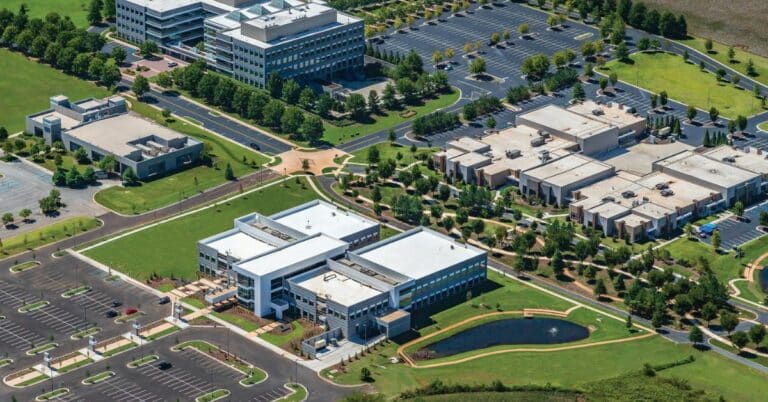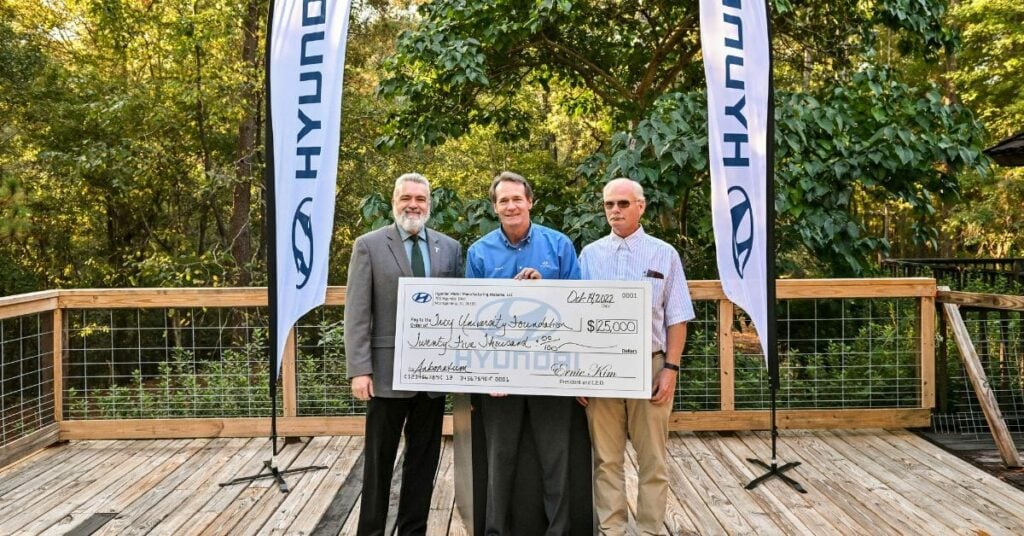HudsonAlpha Institute for Biotechnology, along with several regional collaborators, was awarded $1 million from the US National Science Foundation’s Regional Innovation Engines, or NSF Engines, program. They are among the more than 40 unique teams to receive one of the first-ever NSF Engines Development Awards, which aim to help partners collaborate and create economic, societal, and technological opportunities for their regions.
The funded project, entitled “Advancing carbon-neutral crop technologies to develop sustainable consumer goods (AL, GA, NC, TN)” (“Greening the Southeast” for short), aims to develop a green, circular bioeconomy for building materials and consumer goods in the Southeast that reduces climate change impacts from manufacturing by eliminating industry reliance on petroleum and environmentally costly fibers.
“Our team brings together researchers across plant genetics and genomics, crop breeders, and experts in biomass processing and biomaterial development to build a pipeline to create products from locally engineered and grown perennial grasses,” says Jeremy Schmutz, HudsonAlpha Faculty Investigator and PI of the project. “We will use underutilized marginal land, improve atmospheric carbon sequestration, reduce imports, and decarbonize industries, all while creating new jobs and training diverse individuals across STEM disciplines.”
The Greening the Southeast team includes diverse partners across the Southeast, each bringing their own expertise to help answer the question, how do we develop and sustain a circular bioeconomy in our region? Included among the numerous partners are several research institutions, industry leaders, educators, and economists. Joining HudsonAlpha are Alabama A&M University Winfred Thomas Agriculture Research Station, Auburn University, North Carolina State University, Tennessee State University, Tuskegee University, the University of Georgia, University of Tennessee, Genera, the National Society for Minorities in Agriculture, Natural Resources and Related Sciences (MANRRS), and other agricultural and workforce development partners.
“As a leading manufacturer of perennial fiber-based products in the US, our company is excited to partner with the HudsonAlpha team on this effort,” says Sam Jackson, Vice President for Feedstocks and Supply Chain for industry team member Genera. “This work will accelerate innovation in utilizing regenerative agriculture to provide significant decarbonization in products consumers use every day.”
The awardees span a broad range of states and regions, reaching geographic areas that have not fully benefited from the technology boom of the past decades. These NSF Engines Development Awards will help organizations create connections and develop their local innovation ecosystems within two years to prepare strong proposals for becoming future NSF Engines, which will each have the opportunity to receive up to $160 million.
“These NSF Engines Development Awards lay the foundation for emerging hubs of innovation and potential future NSF Engines,” said NSF Director Sethuraman Panchanathan. “These awardees are part of the fabric of NSF’s vision to create opportunities everywhere and enable innovation anywhere. They will build robust regional partnerships rooted in scientific and technological innovation in every part of our nation. Through these planning awards, NSF is seeding the future for in-place innovation in communities and to grow their regional economies through research and partnerships. This will unleash ideas, talent, pathways and resources to create vibrant innovation ecosystems all across our nation.”
Launched by NSF’s new Directorate for Technology, Innovation and Partnerships and authorized by the “CHIPS and Science Act of 2022,” the NSF Engines program uniquely harnesses the nation’s science and technology research and development enterprise and regional-level resources. NSF Engines aspire to catalyze robust partnerships to positively impact regional economies, accelerate technology development, address societal challenges, advance national competitiveness, and create local, high-wage jobs.
“The ENGINES program provides such a unique opportunity to have an impact that will benefit our stakeholders and advance our resilience in the face of future climate events,” said Dr. Nicole Labbé, Professor and Assistant Director of the Center for Renewable Carbon at the University of Tennessee- Knoxville. “We’re particularly excited to work with this creative and energetic team of leaders that is intent on expanding the southeast’s bioeconomy, creating a bright future with new avenues for prosperity.”
View more information about the planning grant on the Greening the Southeast website. View a map of all the NSF Engines Development Awards. More information can be found on the NSF Engines program website.
This material is based upon work supported by the National Science Foundation under Grant No. 2302898. Any opinions, findings, conclusions, or recommendations expressed in this material are those of the author(s) and do not necessarily reflect the views of the National Science Foundation.
If you have exciting news to share with the Central Alabama business community, send your press releases (and high-quality images) to [email protected].







